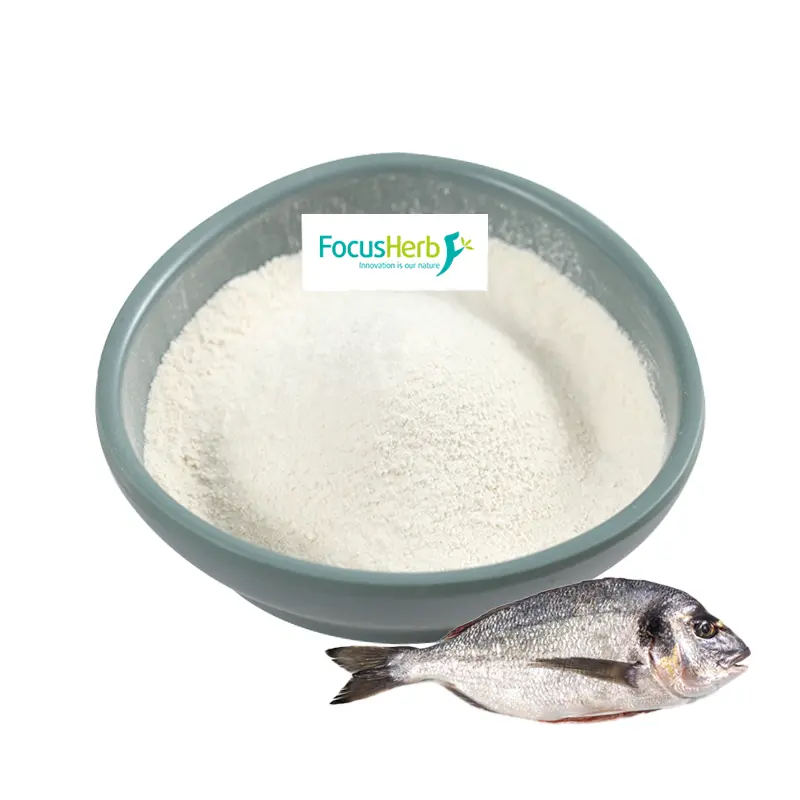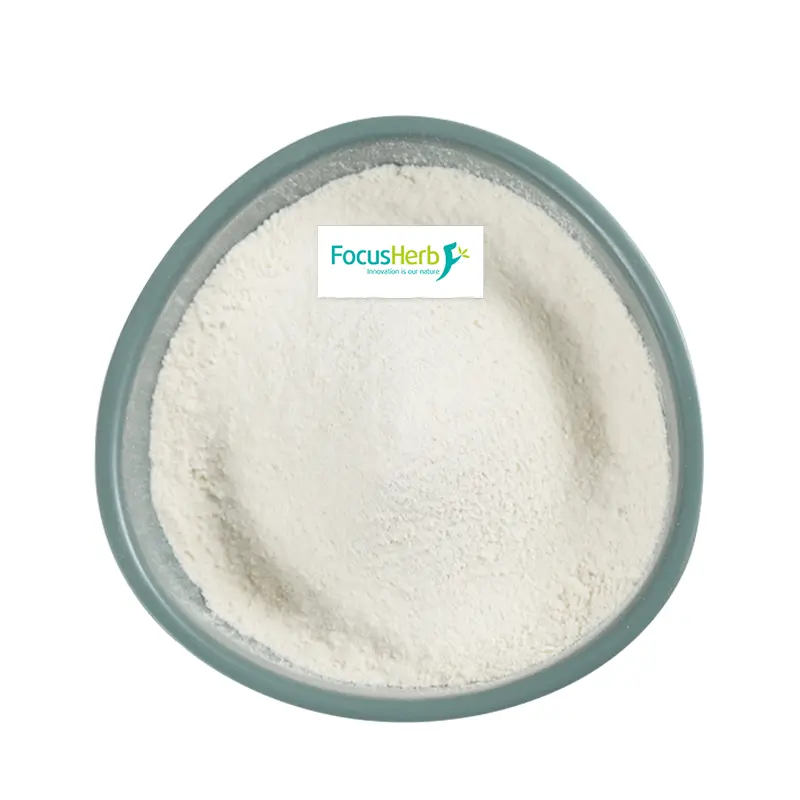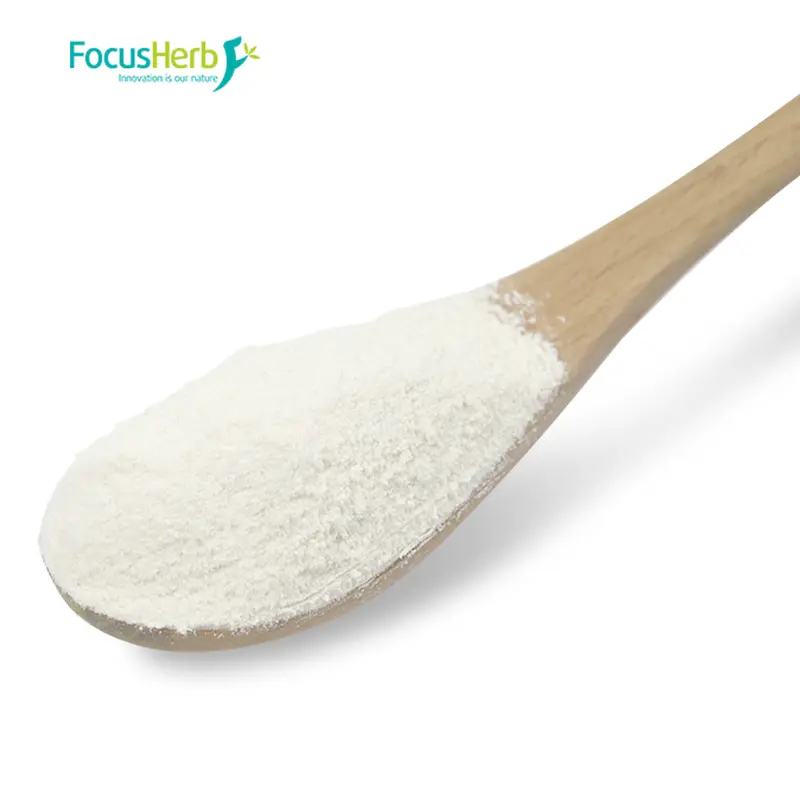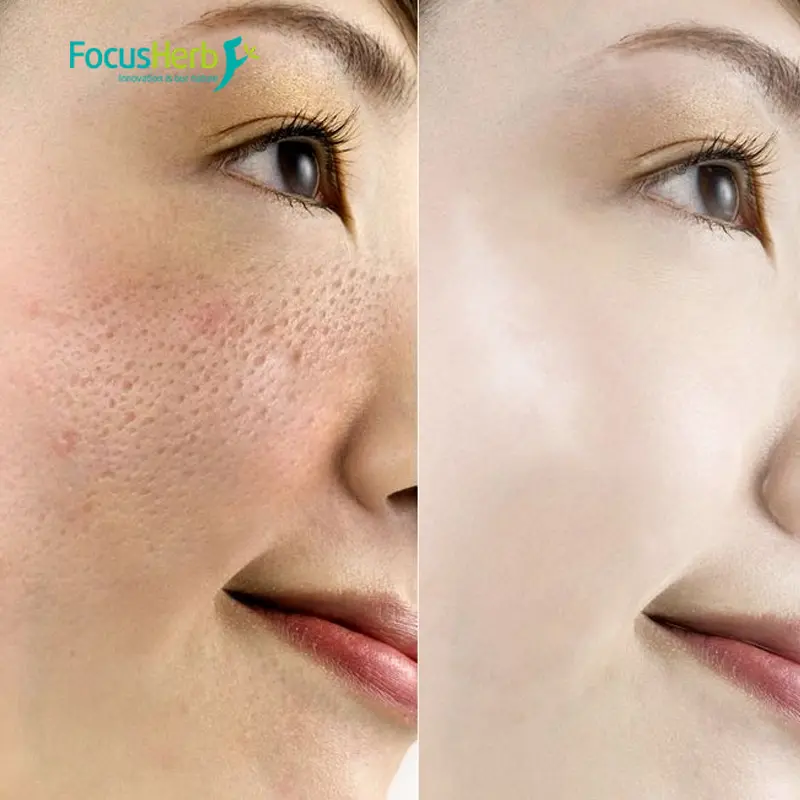Fish collagen generally refers to a high-molecular-weight functional protein extracted from fish. It is primarily derived from the fresh skin and scales of tilapia, cod, and other fish, which are rich in collagen. During the extraction process, enzymatic directed shearing technology is often used. This technique precisely extracts the desired collagen components from fish tissue, ensuring the integrity of its molecular structure and biological activity. The extracted collagen primarily consists of type I collagen.
Fish collagen products are rich in 19 amino acids, which contribute to their high nutritional value and diverse physiological functions. Among them, glycine, proline, and hydroxyproline are particularly prominent. Glycine accounts for approximately 30% of the total amino acid composition and plays a key role in maintaining collagen’s structural stability. Proline, which accounts for over 10%, is closely associated with collagen’s toughness and elasticity. Hydroxyproline, a collagen-specific amino acid, plays an essential role in maintaining the stability of its triple helix structure. This unique amino acid composition distinguishes fish collagen from other common proteins and gives it many special benefits.
Unique Extraction Process
Among the many methods for extracting fish collagen, enzymatic hydrolysis stands out due to its numerous advantages, becoming a commonly used and advanced technique. The enzymatic hydrolysis process for extracting fish collagen is meticulous and rigorous, encompassing the following key steps:
Cleaning: Cleaning the raw materials is essential for extracting high-quality fish collagen. If processing the raw materials in-house, fish such as cod caught from deep sea water must first be carefully sorted to remove surface impurities and attached non-collagenous tissue. Next, collagen-rich areas such as the skin and scales must be separated. These raw materials are then placed in a floor cleaning tank, rinsed with deionized water, and degreased and de-ashed with an appropriate amount of acid or alkaline solution. During this process, the pH concentration must be strictly controlled to ensure effective impurity removal without damaging the collagen structure. If de-ashing fish is purchased directly from a raw material supplier, the de-ashing step can be simplified, but cleaning is still essential to ensure the cleanliness of the raw materials.
Enzymatic Hydrolysis: The cleaned and pre-treated fish skin or scales are placed in a double-layered, insulated, and pressure-resistant enzymatic hydrolysis tank, where the enzymatic hydrolysis reaction begins. The enzymatic hydrolysis process requires precise control of multiple conditions, such as temperature, pH, and the type and dosage of enzymes. Specific proteases, such as neutral proteases and flavor proteases, are typically used. These enzymes recognize and cleave specific peptide bonds within collagen molecules, breaking them down into smaller peptide fragments or amino acids. For example, when extracting collagen from tilapia skin, the skin is mixed with an appropriate amount of enzyme solution, the pH adjusted to 7.5-8.0, and the temperature controlled at around 45°C. Enzymatic hydrolysis is then initiated, with constant stirring to ensure adequate contact between the enzyme and the substrate. The reaction typically lasts 2-3 hours. After the desired reaction time, the enzymatic hydrolysis reaction is terminated by heating or the addition of inhibitors to prevent excessive degradation and compromise of collagen quality.
Filtration: After the enzymatic hydrolysis reaction is complete, the hydrolyzed solution is finely filtered using a vertical diatomaceous earth filter. This step is crucial, effectively removing impurities, unreacted fish skin residue, and residual enzymes from the enzymatic hydrolysate, ensuring it meets the requirements for the next process. The filtered enzymatic hydrolysate is collected in a single-layer pressure-resistant storage tank. The workshop must maintain normal operation of 100,000-class air conditioning and purification equipment to maintain a clean production environment and prevent secondary contamination.
Bottling (optional): If the product is ultimately intended for liquid form, the filtered liquid can be directly packaged into standard small drums. Prior to filling, the drums must be dried and sterilized to ensure microbiological safety. After filling, qualified products can be stored.
Concentration and spray drying: If the product is intended for powder form, the filtered liquid undergoes concentration and spray drying. First, the enzymatic hydrolysate is concentrated in a single-effect falling film concentrator to a desired concentration, which improves the efficiency and cost-effectiveness of the subsequent spray drying process. The concentrated liquid then enters a centrifugal spray dryer, where high-temperature hot air instantly evaporates the water, forming a dry collagen powder. This powdered fish collagen is easier to store, transport, and use, and also extends the product’s shelf life to a certain extent.
Enzymatic hydrolysis offers many significant advantages for extracting fish collagen. Firstly, the mild conditions of the enzymatic hydrolysis process maximize the preservation of the collagen’s natural structure and biological activity, avoiding the potential disruption of the collagen’s molecular structure and alteration of its physical and chemical properties during traditional acid or alkaline extraction processes, thereby ensuring the collagen’s quality and efficacy. Secondly, enzymatic hydrolysis offers high selectivity. By selecting the appropriate enzyme and hydrolysis conditions, collagen fragments with specific molecular weights and functionalities can be obtained to meet the needs of diverse applications.
Multifaceted Benefits Revealed

Beauty and Skincare
Hydration: Fish collagen possesses powerful moisturizing properties, stemming from its unique molecular structure. Its triple helix structure absorbs large amounts of water, acting like an efficient sponge, forming a natural moisture barrier within the skin, helping it maintain hydration. When the stratum corneum is well-hydrated, the skin appears plump, smooth, and soft to the touch, with a healthier, more radiant appearance. For example, some people who regularly use fish collagen products experience a significant reduction in dry, flaky skin, maintaining a high level of hydration even in the dry autumn and winter seasons.
Pore Tightening: With aging or irregular lifestyles, the skin’s water-oil balance can be disrupted, leading to excessive oil secretion, which can eventually lead to enlarged pores. Once absorbed by the skin, fish collagen increases the skin’s water-retention capacity, helping to regulate the skin’s water-oil balance and prevent excessive oil secretion. It also enhances skin firmness, tightening the skin around pores and thus minimizing pores. After using skincare products containing fish collagen for a period of time, many people have noticed that their previously enlarged pores have become finer and their skin texture has significantly improved.
Wrinkle and Spot Reduction: Collagen in the skin is a key component that maintains skin elasticity and firmness. With aging, the body’s ability to synthesize collagen gradually decreases, leading to a continuous loss of collagen in the dermis. This leads to a gradual loss of skin elasticity, resulting in sagging and wrinkles. Supplementing with fish collagen can fill in the skin’s sunken areas caused by collagen loss, promote the regeneration and reorganization of collagen fibers in the skin, enhance skin elasticity, and gradually reduce wrinkles. Furthermore, the peptides in fish collagen can inhibit tyrosinase activity, reduce melanin synthesis, and prevent the formation of dark spots at the source. It can also help reduce existing dark spots. Many women who regularly supplement with fish collagen have noticed that their wrinkles have become lighter, dark spots have become less noticeable, and their skin condition has significantly improved.
Acne Scar Repair: Acne scars left after acne resolves are often a source of concern for many people. Fish collagen has a unique healing effect on the skin. It binds tightly to surrounding cells, promoting skin cell regeneration and repair. When acne scars form on damaged skin, fish collagen can stimulate new cell growth, accelerate the healing of damaged skin tissue, help repair acne scars, and restore smooth, even skin. Clinical studies have shown that using products containing fish collagen in certain skin repair treatments can significantly shorten the healing time of acne scars and improve skin appearance.
Health and Wellness
Strong Bones: Bones are a vital support structure for the human body, with over 70% of their organic matter comprising collagen. As a high-quality source of collagen, fish collagen provides essential nutritional support for bones. It promotes calcium deposition and absorption in bones, increasing bone density and strengthening bones, effectively preventing bone diseases such as osteoporosis. For middle-aged and elderly individuals, as they age, their bones gradually lose collagen, becoming fragile and prone to fracture. Appropriate supplementation with fish collagen can help maintain bone health and strength. Studies have found that people who regularly supplement with fish collagen experience a significantly slower rate of bone density loss and a relatively lower risk of fractures.
Promoting Muscle Growth: Fish collagen is a crucial component of muscle tissue and plays a key role in muscle growth and repair. During physical exercise or physical labor, muscles sustain some degree of damage. Supplementing with fish collagen can provide adequate nutrition to muscle cells, promoting repair and regeneration, and helping to increase muscle strength and size. For athletes, fitness enthusiasts, and those who engage in heavy physical labor, appropriate fish collagen supplementation can accelerate muscle recovery, reduce fatigue, and improve athletic performance. Studies have shown that supplementing with fish collagen during strength training significantly increases muscle strength and mass compared to those who do not supplement.
Improving Joint Health: Joints are crucial hubs for human movement, and articular cartilage and synovial tissue are rich in collagen. With aging, excessive exercise, or joint injury, collagen in the joints gradually depletes, leading to wear of the articular cartilage and inflammation of the synovium, resulting in joint pain, stiffness, and limited mobility. Fish collagen can replenish collagen lost in joints, increase the elasticity and toughness of articular cartilage, reduce friction between joints, and lubricate and protect joints, effectively relieving joint pain and improving joint mobility. For patients with joint conditions such as osteoarthritis, supplementing with fish collagen can alleviate symptoms and improve quality of life. Numerous clinical studies have confirmed the positive effects of fish collagen in improving joint health.
Improving Immunity: The immune system is a crucial line of defense against disease, and fish collagen plays a crucial role in its normal function. It enhances immune cell activity and promotes immunoglobulin synthesis, helping the body better identify and resist invading pathogens, thereby boosting immunity. Enhanced immunity effectively prevents various illnesses, such as colds and the flu, and even if an infection occurs, allows for faster recovery. Some individuals with weaker constitutions and prone to illness have experienced significantly fewer colds and shorter recovery times after consistently supplementing with fish collagen.
Suitable for: People and Precautions
Suitable for
People with poor skin condition: With aging, or due to factors such as long-term exposure to UV rays and irregular sleep patterns, the skin gradually loses collagen, leading to dryness, roughness, sagging, wrinkles, enlarged pores, dullness, and freckles. Supplementing with fish collagen can provide the skin with essential nutrients, helping to restore hydration, elasticity, and radiance, improving these conditions and promoting healthier and more beautiful skin. For example, many women over 30 experience sagging skin and fine lines due to accelerated collagen loss. Supplementing with fish collagen can significantly improve their skin condition.
Perimenopausal women: During perimenopause, estrogen levels in women decrease significantly, leading to decreased collagen synthesis and accelerated loss, resulting in a range of problems such as sagging skin, joint pain, and bone loss. Supplementing with fish collagen can help alleviate these symptoms, enhancing skin elasticity, reducing joint discomfort, and increasing bone density, thereby improving the quality of life for perimenopausal women. Studies have shown that perimenopausal women who regularly supplement with fish collagen experience improved skin firmness and some relief from joint pain.
Sports Enthusiasts: People who regularly engage in high-intensity exercise place greater stress on their muscles and joints, making them susceptible to muscle strains and joint wear. Fish collagen is a crucial component of muscle and joint tissue. Supplementing with fish collagen can promote muscle repair and growth, enhance joint stability and flexibility, reduce the occurrence of sports injuries, and help athletes recover faster and improve their performance. For example, professional athletes use fish collagen supplements during training to accelerate muscle recovery and prevent joint injuries.
Those with Bone Health Needs: As middle-aged and elderly individuals experience declining physical function, they experience a continuous loss of collagen and calcium in their bones, resulting in decreased bone density and a higher risk of osteoporosis and other bone diseases. Fish collagen promotes calcium absorption and deposition, enhancing bone toughness and strength, and plays a positive role in preventing and improving bone conditions like osteoporosis. Furthermore, adolescents experience rapid bone growth during their growth and development stages, and appropriate fish collagen supplementation can also contribute to healthy bone development. Studies have shown that long-term fish collagen supplementation in middle-aged and elderly individuals increases bone density and reduces fracture risk.
Precautions
Minors: Minors are in a critical period of growth and development, and their bodies have a strong capacity for collagen synthesis. Supplementing with fish collagen may disrupt their body’s nutritional balance and affect normal growth and development. Therefore, casual fish collagen supplementation is not recommended for minors. They should ensure adequate nutrition through a balanced diet to promote natural growth.
Pregnant and Breastfeeding Women: During pregnancy, pregnant women experience a unique physiological state, with nutrient requirements and metabolism varying from normal. While fish collagen is rich in nutrients, research on its effects on fetal development during pregnancy is insufficient. To avoid potential risks, pregnant women should exercise caution when supplementing with fish collagen. Breastfeeding women should also be aware that fish collagen may be passed to the baby through breast milk, which also carries unknown risks. Therefore, casual supplementation is not recommended during breastfeeding. If necessary, it should be taken under the guidance of a doctor. Seafood allergies: Fish collagen is primarily extracted from fish. For those allergic to seafood, consuming fish collagen products is highly likely to trigger allergic reactions, such as itching, rashes, shortness of breath, and gastrointestinal discomfort. In severe cases, these reactions can be life-threatening. Therefore, people with seafood allergies should strictly avoid consuming fish collagen products. They can choose collagen alternatives from non-fish sources, such as collagen extracted from animal tissues like pigs and cows, but they should also confirm their allergies to these sources before choosing.
Patients with special medical conditions: Those with severe hepatic and renal insufficiency have impaired liver and kidney metabolism, preventing them from properly metabolizing and excreting nutrients. Fish collagen needs to be metabolized by the liver and kidneys after entering the body. Supplementing with large amounts can increase the burden on the liver and kidneys, further impairing their function. Furthermore, those taking certain medications should consult a doctor before taking fish collagen supplements, as fish collagen may interact with certain medications, affecting their effectiveness or causing adverse reactions. For example, fish collagen supplementation may increase the risk of bleeding in patients taking anticoagulants. Therefore, when patients with special diseases consider supplementing fish collagen, they must first consult a professional doctor and make reasonable supplements under the doctor’s guidance.
Market Products and Selection Guide
Product Forms
Powder: Fish collagen powder is one of the most common product forms. It is typically dried to a fine powder, making it easy to store and transport. The advantage of powders is that they allow for easy dosage control, allowing consumers to flexibly adjust the dosage based on their needs. Furthermore, powders are relatively stable and, when properly sealed and stored in a dry, cool environment, have a long shelf life. For example, some well-known fish collagen powder brands on the market come in individually packaged, small packages, making them not only convenient to carry but also protecting them from moisture and deterioration after opening. To consume, the powder can be directly poured into warm water, stirred, and consumed. It can also be added to beverages like milk and juice for a richer taste.
Oral Liquid: Fish collagen oral liquid is made by dissolving fish collagen in a liquid. These solutions are typically packaged in small bottles for easy, ready-to-drink consumption. The advantage of oral liquids is their relatively high absorption rate, as the liquid form is more readily absorbed by the body. Furthermore, oral liquids may be supplemented with other nutrients during the production process, such as vitamin C and hyaluronic acid. These ingredients work synergistically with fish collagen to further enhance the product’s effectiveness. For example, some oral liquids contain vitamin C, which can promote collagen synthesis and enhance its beauty and skincare benefits. Oral liquids also come in a variety of flavors, including fruity and sweet, making them suitable for those who dislike the texture of powders or have difficulty swallowing. However, oral liquids require careful storage and should be consumed promptly after opening to prevent bacterial growth and spoilage.
Capsules: Fish collagen capsules are made by encapsulating fish collagen powder in capsules. Capsules offer the advantages of ease of use and portability, making them particularly suitable for frequent travelers. They prevent direct contact of fish collagen with the mouth and gastrointestinal tract, reducing odor and discomfort. Capsules also protect the fish collagen from premature breakdown by stomach acid, allowing it to reach the intestines for more complete absorption. Fish collagen capsules are available in various sizes and dosages, allowing consumers to choose the right product for their needs. However, when choosing capsule products, pay attention to the quality of the capsule shell and choose products that meet food safety standards to avoid health risks from capsule shell quality issues.
Skincare products: Skincare products containing fish collagen are also common in the market, such as creams, lotions, masks, and serums. These products apply fish collagen directly to the skin’s surface, replenishing collagen loss to a certain extent and providing moisturizing, firming, and anti-wrinkle benefits. For example, a fish collagen mask delivers a large amount of collagen to the skin during application, instantly hydrating and plumping it up; while a fish collagen cream can be added to your daily skincare routine to continuously nourish the skin, enhancing its elasticity and radiance. However, it’s important to note that the larger molecules of fish collagen in skincare products make it difficult for the skin to fully absorb, so it primarily provides surface nourishment and protection.
Selection Tips
Investigate the source of raw materials: The source of raw materials directly impacts the quality of fish collagen. Deep-sea fish, such as cod and tilapia, live in relatively clean deep-sea environments, so the fish collagen extracted from them is less likely to be contaminated and of higher quality. For example, North Atlantic cod has a long growth cycle and delicious meat. Collagen extracted from its skin and scales is rich and highly safe. However, collagen extracted from some freshwater fish or fish from polluted waters may contain harmful substances such as heavy metals, posing a potential health risk. Therefore, when choosing products, prioritize those clearly labeled as originating from deep-sea fish.
Check product certifications: Product certification is an important criterion for evaluating the quality and safety of fish collagen products. Commonly recognized certifications include those from the US Food and Drug Administration (FDA), the EU organic certification, and the China Food and Drug Administration (CFDA). Products with these certifications demonstrate compliance with relevant standards and requirements in production processes, quality control, and safety. For example, an FDA-certified fish collagen product indicates that it has undergone rigorous review and testing by the US Food and Drug Administration, ensuring a high degree of quality and safety. When purchasing products, check for relevant certification logos on the packaging to ensure you are purchasing reliable products.
Choosing the right dosage form: Different dosage forms of fish collagen products vary in absorption, ease of use, and taste. Consumers should choose based on their needs. For efficient absorption, oral liquids are a good choice. For frequent business trips or travel, capsules and small powder packages are more convenient to carry. For those who value taste, choose oral liquids with different flavors or powders that can be added to drinks. For those who want to directly improve their skin’s appearance, skincare products containing fish collagen are more suitable. For example, an office worker who frequently works overtime and stays up late, suffers from poor skin, and lacks time for meticulous skincare. A convenient fish collagen oral liquid provides nutritional supplements without taking up too much time. A fitness enthusiast who frequently trains outdoors can choose easy-to-carry capsules or individually packaged powders to supplement their fish collagen anytime, anywhere.
Content and Purity: The content and purity of fish collagen directly impact its effectiveness. When choosing a product, carefully review the ingredient list on the label to understand the specific fish collagen content. Generally speaking, a higher content is likely to be more effective. Purity is also a key factor. High-purity fish collagen products have fewer impurities and are more reliable for efficacy. For example, some high-quality fish collagen products can contain over 90% fish collagen. These high-content, high-purity products often offer more pronounced benefits for beauty, skincare, and health. However, products with lower content and lower purity may not achieve the desired results.
Observe word-of-mouth reviews: Product reputation and reviews are crucial for consumer purchasing decisions. You can learn about other consumers’ experiences and feedback on product performance by reviewing user reviews on e-commerce platforms, professional health forums, and social media. For example, on one e-commerce platform, a fish collagen product received numerous positive reviews, praising noticeable improvements in skin quality and relief from joint pain. This demonstrates the product’s proven success. However, it’s important to note that reviews can be subjective and skewed, requiring a comprehensive assessment. Don’t make purchasing decisions based solely on individual reviews.
How to Choose High-Quality Fish Collagen Products
With a wide variety of fish collagen products available, and their quality varying widely, choosing high-quality products has become a crucial skill for consumers.
First, consider the source of the raw materials. High-quality fish collagen is typically extracted from deep-sea fish, such as cod and salmon. These deep-sea fish live in pristine waters far from pollution, resulting in highly purified, safe, and reliable collagen. For example, cod from the Arctic Circle, where the cold, pollution-free environment provides superior fish collagen. However, collagen extracted from freshwater fish or fish from polluted waters may contain excessive levels of heavy metals and pathogenic bacteria, posing potential health risks and should be avoided.
Second, the extraction process is crucial. Advanced enzymatic hydrolysis methods extract collagen under gentle conditions, preserving its activity and nutrients to the greatest extent possible, making it more readily absorbed by the body. Traditional acid or alkaline extraction of fish collagen may damage its structure, reducing its activity and thus its effectiveness. Therefore, when choosing a product, check the product description to understand the extraction process, and prioritize fish collagen products extracted using enzymatic methods.
Observing the product’s appearance can also help us judge its quality. High-quality fish collagen products generally exhibit excellent appearance. For example, fish collagen powder should have a uniform, natural color, a light milky white or light yellow, free of visible impurities, a fine texture, good fluidity, and a smooth feel. Fish collagen oral liquid should be clear and transparent, free of precipitates or suspended matter, and have a fresh, natural aroma without pungent or unpleasant odors. Products with unusual color, visible precipitates or suspended matter, or an unpleasant odor are likely of poor quality and should not be purchased.
Paying attention to the product’s ingredient list is also essential. Carefully review the ingredient list to ensure that, in addition to the fish collagen, the types and amounts of other additives in the product are reasonable. Try to choose products with fewer additives and no artificial colors, flavors, or preservatives to reduce potential burden on the body. Also, pay attention to the fish collagen content in the ingredient list. A higher content indicates a more abundant supply of active ingredients and potentially better efficacy. For example, some high-quality fish collagen products will clearly indicate the fish collagen content and highlight it as a key ingredient.
Brand and reputation are also important considerations. Choosing well-known brands with a good reputation can, to a certain extent, guarantee product quality and safety. Well-known brands typically possess advanced production technology, strict quality control systems, and comprehensive after-sales service, making them more trustworthy. You can learn about a product’s reputation by reviewing consumer reviews, consulting professionals, or consulting with authoritative organizations. For example, if a brand of fish collagen product has a large and loyal user base and consumers generally report significant results and reliable quality, it is more worth considering.






















